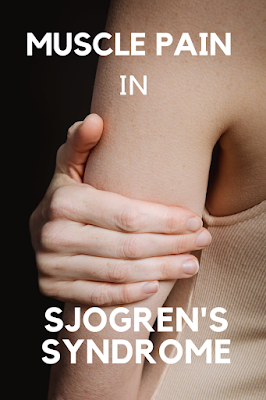According to the Sjögren’s Foundation and the Cleveland Clinic, muscle pain is a symptom of Sjogren's syndrome. This is also confirmed by Sjogren's Syndrome: A Clinical Handbook by Frederick B. Vivino which states that myalgias are seen in 70% and less of Sjogren's patients. Myalgia, the medical term for muscle aches and pain, is often used in the medical literature when describing the symptoms of Sjogren's syndrome.
Not much is often said about muscle pain in SS and it is often grouped together as 'joint and muscle pain'.
Joint and muscle pain are commonly observed in patients with primary Sjögren's syndrome (pSS). ~
They go on to say "Widespread pain, often assuming the features of fibromyalgia, has also been reported in patients with pSS. The pathological mechanisms underlying both neuropathic pain and widespread (fibromyalgia) pain in pSS have not been so far completely clarified."
Myalgias, or muscle pains, are grouped into different types, by rheumatologists, depending on their relationship to exercise. For example muscle pain caused by exercise, which can come on during or after the exercise; muscle pain that comes on 24 to 48 hours after exercise, which is called post-exertional; and muscle pain at rest. This type of muscle pain - muscle pain at rest - is usually not associated with a muscle disease. This is the most common type of muscle pain experienced in people with Sjogren's syndrome from anecdotal evidence.
This article, on Myalgias and Polyarthralgias Syndrome, states that Sjogren's syndrome is one of the rheumatic diseases that have non-muscular causes of myalgia i.e. it produces muscle pain not related to exercise.
Less frequently, myalgia can also be due to:
1. Non-muscular causes:
They generally produce myalgias not related to exercise.
a) Metabolic and endocrine disorders:
• Hypothyroidism.
• Hypoparathyroidism.
• Osteomalacia.
• Uremia.
• Liverfailure.
• Suprarrenal insufficiency.
• Magnesiumdeficiency.
• Thiaminedeficiency.
b) Rheumatic diseases:
• Polymyalgiarheumatica.
• Myofascialpain.
• Lupus.
• Mixedconnectivetissuedisease.
• Sjogren'ssyndrome.
• Rheumatoidarthritis.
• Benignhypermobilitysyndrome.
According to people living with Sjogren's syndrome muscle pain is definitely a symptom. I have done surveys with many people diagnosed with SS on my Facebook page over the years and many people report it as a symptom.
So now that we have found out that Sjogren's can cause muscle pain let's find out what is done about muscle pain in Sjogren's syndrome.
When treating SS, many doctors tend to mainly treat the symptoms and keep watch for any complications of the disease. On many sites, to the frustration of people living with SS, the treatments explained are all to do with dryness of the eyes and mouth. Nonsteroidal anti-inflammatory drugs (NSAIDs) are usually prescribed for muscle pain and joint pain. They reduce pain and inflammation.
As SS is a systemic disease some people are treated with drugs that should reduce all the symptoms including muscle pain. This is usually a decision, made by the specialist when weighing up the patient's overall symptoms with the benefits and side effects of these medications.
Disease-modifying antirheumatic agents (DMARDs) are used to regulate the immune system. Hydroxychloroquine (Plaquenil) is sometimes prescribed for the treatment of muscle pain.
Corticosteroids are usually only prescribed for the treatment of severe extra-glandular manifestations of SS. They suppress the inflammatory genes.
Alternative treatments that may give relief of muscle pain include massage, stretching, yoga, hydrotherapy, saunas and hot tubs.
My personal experience with muscle pain is that it was the first of my symptoms. I had sore calf muscles that would not relax. I did not even consider dry eyes and dry mouth as a symptom when I first went to the doctor. After receiving a diagnosis and doing a short 6-week course of corticosteroids I felt no relief from my symptoms. This was explained to me as being due to not receiving an early diagnosis. This has led me to try and rely upon non-medical ways to reduce my symptoms. The treatments that have helped me most with reducing muscle pain are myofascial massage and hydrotherapy lessons for people with arthritis. As I understand it they both reduce pain by increasing muscle length and allowing normal movement which can, in turn, increase the muscle strength and reduce pain.
SOURCES:
- Sjögren’s Foundation symptoms
- Cleveland Clinic
- Sjogren's Syndrome: A Clinical Handbook by Frederick B. Vivino. Table 6.2
- Myalgias and Polyarthralgias Syndrome: A Brief Review Jaime Alberto Restrepo Manotas, Murillo MA, Herrera IA, García NW, Cobaleda LP, Osorio PA, González MC, Torres JA, Botero DA, López MQ and Ruiz JE
- Pain in primary Sjögren's syndrome Claudio Vitali, PMID: 26267000 DOI: 10.1016/j.berh.2015.05.002


Comments
Post a Comment